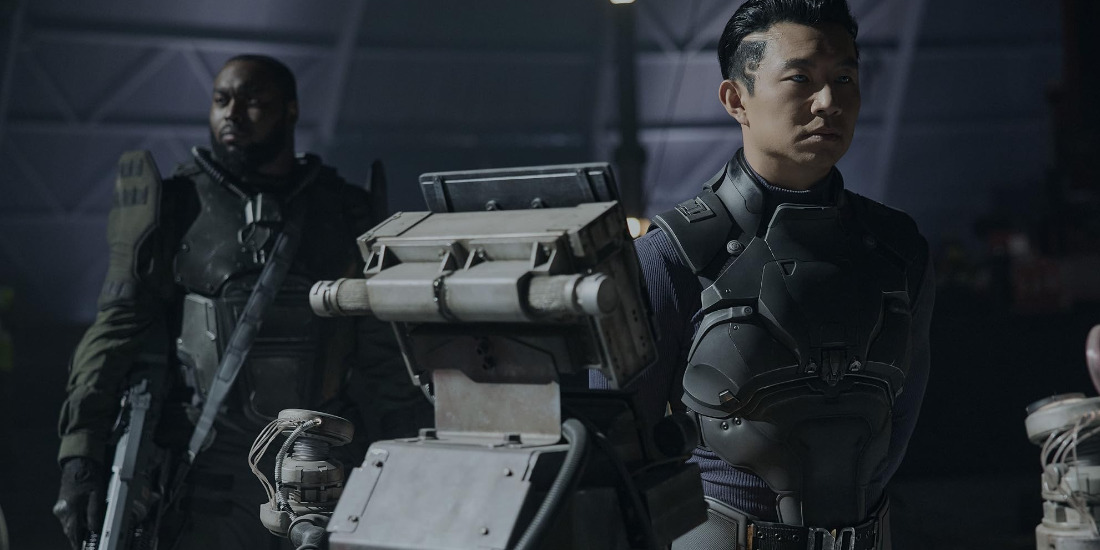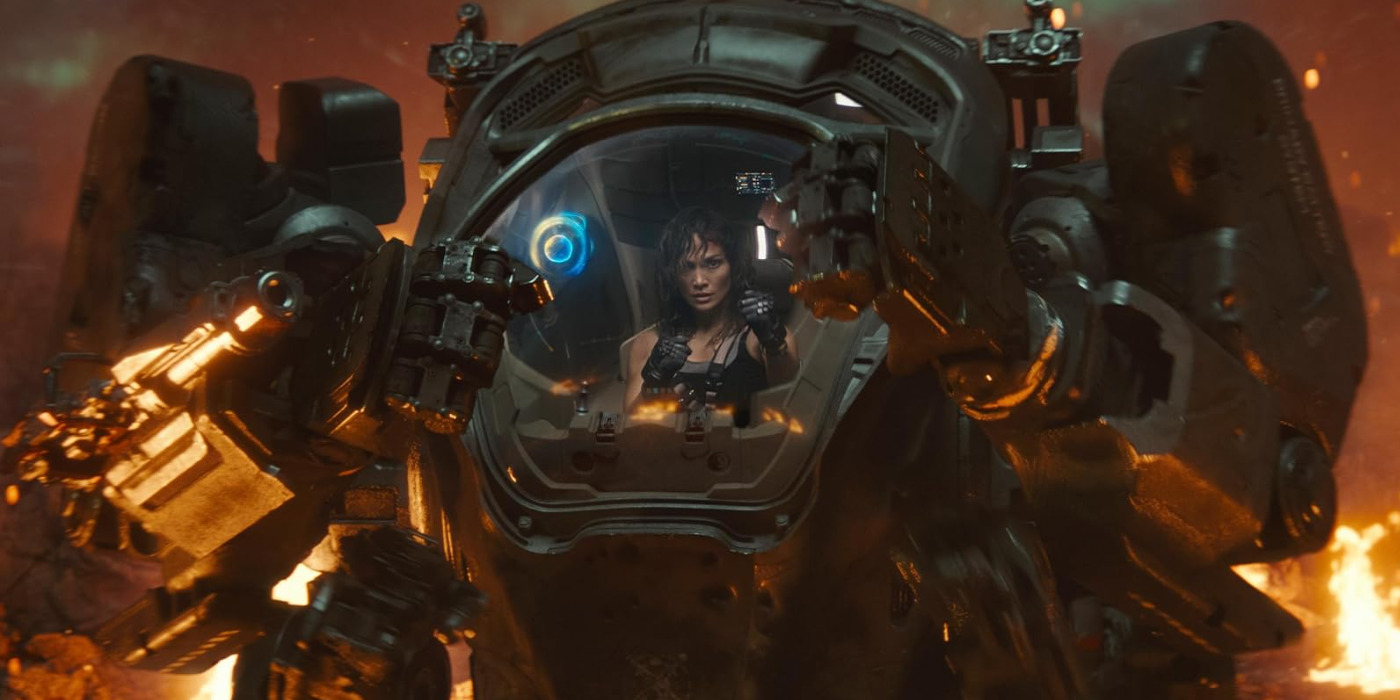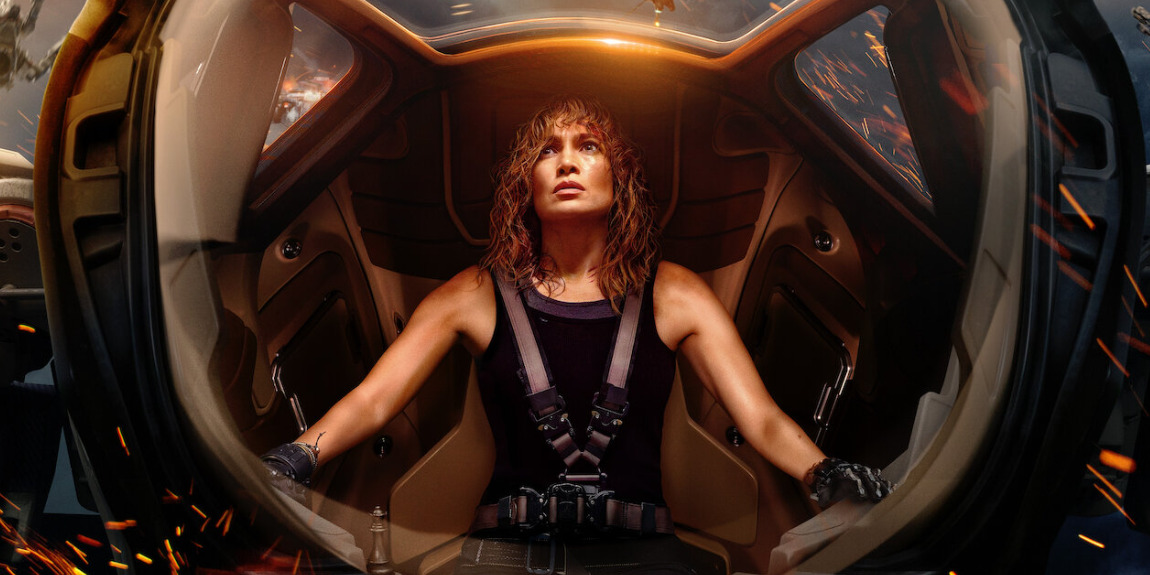‘Atlas,’ Netflix’s science fiction film starring Jennifer Lopez, Simu Liu, and Sterling K. Brown, presents an entertaining story about a war between humanity and Artificial Intelligence. The narrative, unfolding in a futuristic landscape, follows the titular Atlas Shepherd, a data analyst who shares a disastrous history with AI. One AI soldier-turned-terrorist in particular, Harlan, remains the woman’s lifelong adversary, who plans on decimating the human race. Consequently, once Atlas successfully tracks the bot and his army down to the exoplanet GR-39, she embarks on a mission to ensure Harlan’s destruction. Only, the mission leaves her stranded on an unknown planet with an AI-powered mech suit, Smith, as her only companion.
The story charts Atlas and Smith’s shared fight against Harlan and his nefarious plans, which unravel on an alien planet. While the premise remains fairly familiar, the film instills a unique perspective by sculpting the narrative around Atlas and Smith’s unconventional partnership built on mutual trust. Thus, since the duo’s survival story hits so many genre marks, fans are bound to wonder about the film’s origins, especially in connection to other existing non-cinematic media.
Atlas: An Original Story With Loose Sci-Fi Inspirations
‘Atlas’ found its inception with screenwriter Leo Sardarian, who worked on the original screenplay. After coming across the project in 2019, Director Brad Peyton worked on the film for two years to mold it into his ideal version. Over the course of the same, Aron Eli Coleite joined the team and worked on his own draft of the screenplay based on Sardarian’s work. In the end, the final script ended up departing significantly from the original screenplay, with Coleite and Peyton bringing brand new elements into the tale.

“I would say the similarities [between the original script and the final script] are [that] there was a woman trapped inside of a mech suit on an alien planet,” said Peyton in a conversation with The Wrap. “There was a very emotional story there with her [Atlas] having lost part of her family to AI. That was there. How that story was told— [it] was very different.” Therefore, the original idea behind ‘Atlas’ remained a story about a conflict between humans and artificial intelligence with— as per the director— a planet-based survival story at its center.
While Peyton’s film retains the same premise, the story gears its narrative more toward the concept of trust between Atlas and Smith. In doing so, the film instills a compelling story about human connection and friendship at the narrative core. As such, the same allows the audience to build emotional connections to the characters and their circumstances. Jennifer Lopez, the lead actress and a producer on the project, shared similar sentiments when discussing the film with Netflix’s Tudum.
“I loved that this is a big sci-fi action movie, but at its core, it’s a story of friendship — and a love story, in a way,” said Lopez. “I always see everything as a love story, but this is a different kind of love between two beings who connect in disastrous circumstances and teach each other how to be more human.” Thus, with Sardarian’s screenplay as the base, paired with Peyton and Coleite’s modifications, the film remains an entirely original work.
Even so, some inspirations linger throughout the film, leading to points of reminiscence between ‘Atlas’ and various other sci-fi stories. For instance, the visualization of the central planet, GR-39, preserves certain references to the sci-fi staple, ‘Star Wars.’ The third installment of the original trilogy reportedly inspired Peyton to include natural ecosystems like deserts and forests into his own alien planet. Furthermore, the filmmaker utilized his own childhood love for the sci-fi genre as a muse.

Notably, Peyton looked up to the works of James Cameron, a fellow Canadian filmmaker who has made waves in the sci-fi genre. Likewise, the 1989 cult classic Stuart Gordon’s ‘Robot Jox’ also remained an influence over the director. In a conversation with Total Film, Peyton elaborated on his fascination with the genre and said, “To me, science-fiction is hallowed ground. And because of that, I don’t want to retread what’s been done well before.”
In the same interview, Peyton also mentioned the franchise ‘Titanfall,’ which has been compared to ‘Atlas’ since the release of the latter’s trailer. “So that was ‘Avatar,’ ‘Aliens,’ ‘Titanfall,’ a few other old movies I loved from the 80s – and then to make sure the scale of mine was different,” he added. “The shape of mine [my film] was different. The movement was different. I wanted this to be its own thing.” Therefore, despite fans’ speculation about a connection between ‘Titanfall’ and ‘Atlas,’ Peyton’s film remains an original work that draws upon its genre to deliver a riveting story.


You must be logged in to post a comment.